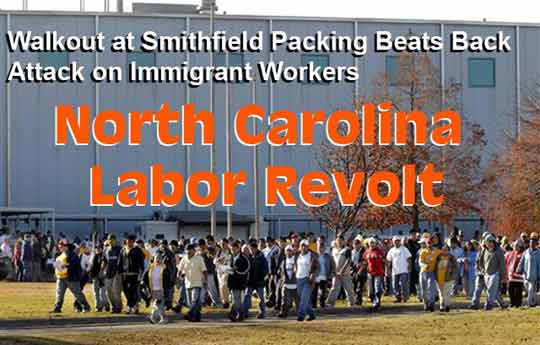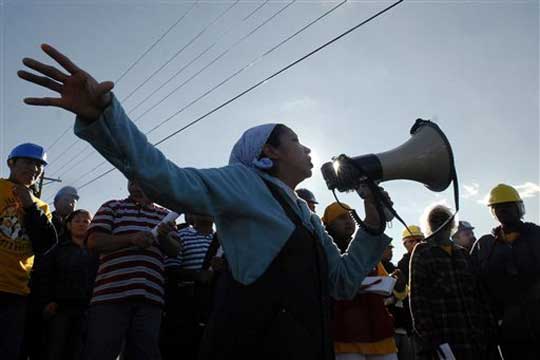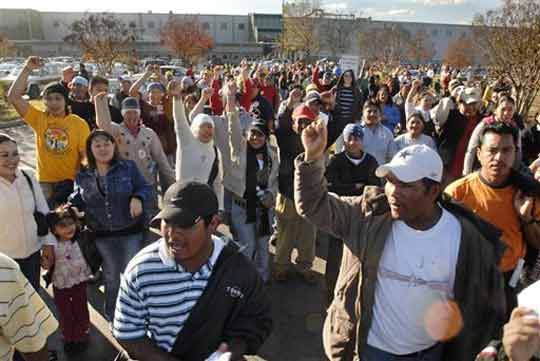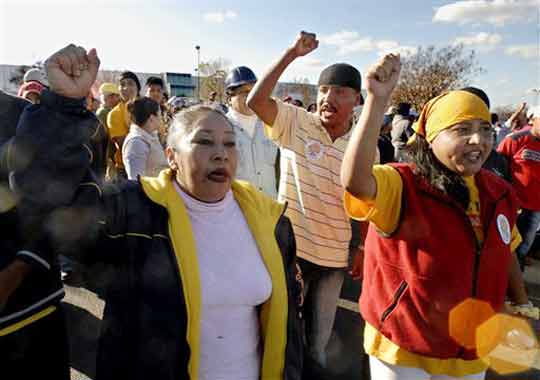Power of Labor

Charleston
Five longshoremen arrested for defending picket lines against cop
attack
(January 2000).
click
on photo for article

South
Carolina clay miners appeal for solidarity in fight for their union
(October
2001).
click
on photo for article
December 2006

Hundreds of employees protesting outside Smithfield Packing Co. in Tar
Heel, North
Carolina, the largest pork-processing plant in the world, November 17.
Strike forced
company to rescind firings. (Photo: Raul Rubiera/Fayetteville
Observer)
On
November 16, the workers
at Smithfield Packing Company in Tar Heel, North Carolina scored a
victory as
over 1,000 black and Latino workers went on strike to defend immigrant
workers fired
because of problems with their documents. Since the beginning of the
month, the
company had dismissed 75 immigrant workers charged with providing
“false
information” because their Social Security numbers didn’t match up.
After a
two-day walkout, amid chants of “si no
hay solución no hay producción” (if there is no
solution, there won’t be
any production), workers won back the jobs of the fired workers along
with
promises of no disciplinary action against those who walked out and
more time
to resolve Social Security issues. The successful walkout at the
non-union
plant was fueled by mounting frustration over the harassment,
degradation and
horrendous working conditions all workers at the plant endure. It
reverberated
nationally, showing that it is possible to resist the federal
government’s
anti-immigrant witch-hunt, as a flood of “no-match” letters have gone
out aimed
at terrorizing workers into submission.
The
dramatic wildcat strike
shook up the Smithfield bosses and set off alarm bells in the media.
“The
workers’ rebellion ignited like a brush fire on Thursday morning,”
reported Newsweek
(18 November) in an article titled, “Thanksgiving Rebellion.” It noted
that in
addition to Latino workers (two-thirds of the workforce), white and
black
workers joined in the protest. The Tar Heel plant is the largest
pork-processing plant in the world, with 5,500 workers slaughtering
32,000 hogs
daily. The company is known for its brutal repression. It was notorious
as the
only meatpacking plant in the United States to have its own private
police
force. More than modern-day Pinkertons, the Smithfield Special Police
had
arrest powers from the state, and arrested about 100 workers since
2001. The
head of the force, former chief of plant security, was found guilty of
violating
the 1871 Ku Klux Klan law after beating union activists in 1997. In
November
2003, these company cops broke a spreading walkout by night-shift
cleaning
workers, causing a panic by announcing that “immigration agents were
waiting
outside to deport them” (Port Folio Weekly, 5 July 2005).
The plant
has been the
scene of a bitter union organizing drive since it was opened in the
early
1990s. This recent firings come amid an intensified unionization drive
by the
United Food and Commercial Workers Union (UFCW). Playing
by the bosses’ rules, the union lost union-representation
elections organized by the National Labor Relations Board at the plant
in 1994
and 1997. However, the results of those votes were thrown out by an
NLRB
administrative law judge who ruled that Smithfield goons had engaged in
“egregious” violations including threatening, intimidating, firing and
even
beating workers involved in the union drive. Human Rights Watch issued
a
report, Unfair Advantage (August 2000) which documented
numerous instances
of the bosses’ terror: confiscated union literature, union supporters
spied on
and suspended, threats to close the plant if a majority of the workers
voted
for the union, threats to deny pay raises and promotions and fire
workers who
voted for the union; threats to force a strike, fire strikers and
blacklist
them in the industry, etc.
Workers Protest Deadly Working Conditions

Worker at Smithfield Packing Co. rallies
fellow strikers during walkout, November 17.
(Photo:
Raul Rubiera/Fayetteville Observer)
At the
plant, workers have
been fighting against conditions which seem to fly out of the pages of
Upton
Sinclair’s novel The Jungle,
written a hundred years ago in 1906
on the inhuman environment workers were subjected to in the Chicago
meatpacking
plants. Following chapter after chapter describing the horrendous
working
conditions, the floors covered with blood, the freezing temperatures
workers
had to endure, the killing pace of the processing line leading to knife
injuries and even death, Sinclair writes of the struggle to organize
the
workers in unions:
“…what the unions were
really trying to do was to put a stop to murder. For murder it was that
went on
there upon the killing floor, systematic, deliberate and hideous murder
– …
They were slaughtering men there, just as certainly as they were
slaughtering
the cattle; they were grinding the bodies and souls of them and turning
them
into dollars and cents.”
–Upton Sinclair, The
Jungle. The Uncensored Original Edition. (See Sharp Press, 2003
[1906])
When
Sinclair
first tried to get his book published, the slaughterhouse companies got
his
publisher, Macmillan, to drop publication. He turned to another
publishing
house, Doubleday, which demanded that he excise whole passages and turn
the
book into a muckraking piece. But as Katherine De Grave, author of the
introduction to the unexpurgated version noted, “Sinclair did not mean
to write
a reformist book but a revolutionary one.” The Jungle is now
officially
celebrated as responsible for the 1906 Pure Food and Drug Act. But a
century
later, most plants are still not unionized, and meatpacking is still
hell.
In an
account on the UFCW’s
website, one former Smithfield worker, Denise Walker, a black woman,
describing
the conditions and degradation she endured, said people were cut,
falling down
on floors, always sick and sometimes killed:
“One time I was inside the
building and the plant was on fire. They had us still in there
working…I'm only
23, but my hands are hurt pretty bad. When I worked at Smithfield, I
hurt my
hands as well as my back, developed pneumonia, and had a miscarriage
from
standing too long on the job. I also had to deal with sexual harassment
from
the managers; they could touch you and make nasty comments and there
wasn't
nothing you could do unless you wanted to lose your job.”
 The North Carolina plant was notorious as
the only packing house with its own company cops, the Smithfield
Special Police. (Photo: UFCW)
The North Carolina plant was notorious as
the only packing house with its own company cops, the Smithfield
Special Police. (Photo: UFCW)
Edward
Morrison, another black worker,
spoke of the murderous speeds at which workers have to operate at
Smithfield:
“That speed is what starts a lot of people’s
demise because people get hurt
when you move that fast. Just like slave driving to me. They set up
conditions
to injure people.” From workers getting stabbed with carving knives to
women
getting sexually harassed on the job, the conditions at Smithfield
packing
house are horrendous. But they are not exceptional.
Last year
another report
was issued by Human Rights Watch, titled Blood, Sweat, and Fear
(January
2005) documenting how the reported injury rate in meatpacking
was four
times that of industry as a whole, with one worker in five
suffering
serious injury and illness every year. The report quoted a
string of
descriptions from OSHA (Occupational Safety and Health Administration)
documents uncovered by the Omaha World Herald in 2003 special
investigative report on conditions in Nebraska slaughterhouses:
“Cleaner killed when
hog-splitting saw is activated.”
“Cleaner dies when he is
pulled into a conveyer and crushed.”
“Cleaner loses legs when a
worker activates the grinder in which he is standing.”
“Cleaner loses hand when
he reaches under a boning table to hold meat from chain.”
“Hand crushed in rollers
when worker tried to catch a scrubbing pad that he dropped.”
In 1906 and
2006 alike, a
large percentage of the workers in this deadly dangerous industry are
immigrants, and particularly undocumented workers without legal rights
who are
doubly fearful of resisting near-slavery conditions in the plants,
running the
risk not only of losing their jobs but also of being deported. About
three-quarters of packinghouse workers are reportedly Latin Americans,
and many
of the rest are Southeast Asians with very few U.S.-born workers. This
past
June, the Immigration and Customs Enforcement (ICE) division of the
Department
of Homeland Security sent out circulars to employers demanding that
businesses
gather names, Social Security numbers and other data on workers across
the
nation as part of its racist “war on terror,” which is really a war to
terrorize the world’s peoples and working people in the U.S. into
submission.
In the post-9/11 hysteria, Democrats and Republicans pushed through
laws
demonizing immigrants. But the walkout in Tar Heel, North Carolina
showed that
through the mobilization of labor’s power these terror tactics can be
defeated.
Since our
inception, the
Internationalist Group has called for united working-class struggle in
defense
of immigrants and immigrants’ rights. In a 1996 leaflet we wrote:
“What’s needed is an internationalist struggle uniting the black, white, Hispanic and Asian working people and youth in the U.S. with their class brothers and sisters abroad who are oppressed by a common enemy: capitalism. Class-conscious workers and defenders of the rights of the oppressed must fight for full citizenship rights for all immigrants!”
This
mobilization must necessarily be political, we stressed, and it must be
directed against both the partner parties of American capitalism. “To
defeat
such powerful forces we need to mobilize real social power, and that is
the
power of millions of workers and minorities whose labor makes the
wheels of
capitalist society turn.”
Bosses Seek to Divide
and
Conquer

Over
1,000 workers participated in the strike action at the plant, forcing
operations to
halt. A union organizing campaign has been stymied by company hardball
tactics.
(Photo: Raul
Rubiera/Fayetteville Observer)
At the
Smithfield plant and
throughout the history of the United States, one of the ways in which
the bosses
kept and continue keeping the workers in submission is through race
division.
The bourgeoisie tries to get black workers to think that immigrant
workers will
“steal their jobs,” by working long grueling hours at low wages while
asking
for no benefits. In turn, the bosses try to convince immigrant workers
that
black workers have a “bad work ethic” because they fight for higher
wages and
better conditions. Class-conscious workers and fighters for immigrant
rights
must consciously fight against these stereotypes promoted by the
capitalists in
order to pursue their “divide and conquer” strategy. Our watchword must
be:
“Workers of the world, unite!” And in the United States, particularly
in former
slave states like North Carolina, what this boils down to is that the
key to
defending immigrant workers is the struggle for black liberation
through
socialist revolution.
At
Smithfield, the company
has consciously tried to set black and Latino workers against each
other, as
well as whites and native Americans. A few years ago, as part of a
series on
“How Race Is Lived in America,” New York Times journalist
Charlie Leduff
decided to get a firsthand experience at what goes on at the Tar Heel
packing
plant. He found that management systematically separated the workforce
according to skin tone:
“Whites, blacks, American
Indians and Mexicans, they all have their separate stations.
“The few whites on the
payroll tend to be mechanics or supervisors. As for the Indians, a
handful are
supervisors; others tend to get clean menial jobs like warehouse work.
With few
exceptions, that leaves the blacks and Mexicans with the dirty jobs at
the
factory… There are English and Spanish lines at the Social Security
office and
in the waiting rooms of the county health clinics.”
–“At a Slaughterhouse,
Some Things Never Die,” New York Times, 15 June 2000
Le
Duff noted
that “The hierarchy of power was summed up on a plaque that hangs in
the
courthouse commemorating the dead of World War I. It lists the veterans
by
color: ‘white’ on top, ‘Indian’ in the middle and ‘colored’ on the
bottom.”
“But as reds and blacks began to make progress in the 1990’s,” he goes
on, “the
Latinos began arriving.” The segregation of workers into different
stations at
the plant is a conscious tool used by the bosses to smash multiracial
unity of
the workforce. Racial slurs and
stereotypes are fanned to spread the flames of mistrust among the
workers. All
this with the same effect: profits for the bosses and wage slavery for
the
workers.
Writing on
similar racial divisions
within the working classes of Europe 135 years ago, Karl Marx remarked:
“Every industrial and
commercial center in England now possesses a working class divided into
two
hostile camps, English proletarians and Irish proletarians. The
ordinary
English worker hates the Irish worker as a competitor who lowers his
standard
of life. In relation to the Irish worker he regards himself as a
member
of the ruling nation and consequently he becomes a tool of the English
aristocrats and capitalists against Ireland, thus strengthening their
domination over himself. He cherishes
religious, social, and national prejudices against the Irish
worker. His
attitude towards him is much the same as that of the ‘poor whites’ to
the
Negroes in the former slave states of the U.S.A. The Irishman
pays him
back with interest in his own money. He sees in the English
worker both
the accomplice and the stupid tool of the English rulers in
Ireland. This
antagonism is artificially kept alive and intensified by the press, the
pulpit,
the comic papers, in short, by all the means at the disposal of the
ruling
classes. This antagonism is the
secret of the impotence of the English working class, despite its
organization. It is the secret by which the capitalist class
maintains its
power. And the latter is quite aware of this.”
–Karl Marx, Letter to
Sigfrid Meyer and August Vogt, April 1870
The
significance of the
victorious walkout of the 17-18 of November was enormous.
For the first time in years the workers
showed what can be done to overcome the boss’s racist war of division
and
deportation. By uniting black and Latino workers in defense of the most
vulnerable sector, immigrant workers accused of lacking the documents
that the
government now demands, workers at Smithfield meat packing plant at Tar
Heel
showed that racist attacks can be defeated. But this was only a limited
victory. The bosses backed off, but didn’t agree to negotiate workers’
grievances, and particularly not with the union. They only agreed to
extend the
deadline for documentation for 60 days. In a subsequent meeting between
management and worker representatives, workers complained that the
bosses
weren’t taking them seriously and further action might be necessary.
Mobilize Labor’s Power

Playing by the bosses rules is a recipe
for defeat. Labor’s gotta play hardball to win.
(Photo: Raul Rubiera/Fayetteville Observer)
Smithfield
workers have
taken the first step. Now it’s up to the unions to bring the power of
the
organized workers movement to bear. While Tar Heel is in North
Carolina,
notorious for government union-busting, it is not far from the
Norfolk-Hampton
Roads-Newport News area, a center of unionized industry. The union
leadership,
however, is calling for an impotent consumer boycott of Smithfield meat
products. This is conscious avoidance of the need to bring out workers’
power
through industrial action and mass mobilization. Ever since UFCW tops
sold out
the 1984-85 Hormel meatpacking strike in Austin, Minnesota, even
setting up a new
local (P-10) to scab on the P-9 strike, they have avoided real union
struggle.
Instead they look to the Democrats in Congress to pass legislation
making it
possible to unionize workers with a simple “card check” registering the
number
of workers who had signed union cards. It would take a sea change in
American
bourgeois politics to bring that about, and even then it won’t win
decent
wages, benefits and working conditions.
In the
media commentaries
on the Tar Heel, North Carolina walkout, a liberal web site,
TomPaine.com, laid
out the “strategy” of appealing to the Democrats: “The good news is
that now we
have a government in place that can help the workers at Smithfield and
other
workplaces demand rights without fear. Days after the Democrats swept
the
midterm elections, the labor group, American Rights At Work, sent out
an action
alert calling on the Speaker-to-be Pelosi to put workers’ rights at the
top of
her agenda.” Yet the Democratic Party is no friend, and Nancy Pelosi is
not
going to fight for workers’ rights. Labor’s battles have to be won the
old-fashioned way, though hard class struggle. And that struggle cannot
be
limited to the U.S.: the fight against Smithfield, a U.S. firm with
global
operations, must be fought internationally, including at its plants in
Poland,
France, Great Britain, Mexico and Poland.
While
Smithfield workers
have shown great willingness to struggle, what’s missing is a
class-struggle leadership that can unite and mobilize the multiethnic
and multinational
working class in common struggle. Such a leadership must educate
immigrant
labor in the need to join their struggle with the emancipation of the
black
worker. As Marx wrote in his book Capital
around the time of the American Civil War “Labor
cannot emancipate itself in the white skin where in the black it is
branded.” At the same time, revolutionaries combat the
anti-immigrant
chauvinism fanned by the bosses among native born black workers. As we
wrote in
1996:
“An internationalist
leadership would fight to win Latinos to the crucial understanding that
the
black question is central to the American socialist revolution. While
today in
many areas, undocumented Latin American and in some cases Asian workers
are
among the lowest paid and most brutally exploited, historically the
black
question is key to all political and social questions in racist
America. The
capitalists, in their perennial effort to set one sector of the
oppressed
against another, will always try to pit blacks versus whites versus
Hispanics
in a struggle for crumbs from a shrinking pie.”
–“Full Citizenship Rights
for All Immigrants!” The Internationalist No. 1,
January-February 1997
The attack
on immigrant
labor and blacks is an attack led by both parties of American
capitalism, the
Republicans and the Democrats. The post 9/11 roundups of immigrants
were in no
way an improvisation by the Bush government. In fact the blueprints
were drawn
up years before. It was Bill Clinton’s 1996 “Illegal Immigration Reform
and
Immigrant Responsibility Act” which made it legally possible to deport
hundreds
of immigrants after the World Trade Center attack. The precursor to the
700-mile wall along the Mexican border that Congress just voted for was
Clinton’s Operation Gatekeeper, which led to over a thousand deaths of
immigrant workers forced cross the scorching deserts. Under Bush, the
Democrats
overwhelmingly supported the U.S.A. PATRIOT Act and voted for the
“Real
ID” Act to deny drivers licenses to undocumented immigrants. The recent
Kennedy-McCain “guest worker” program would reestablish indentured
servitude.
In the
original text of his
novel, The Jungle, Upton Sinclair introduced a character, a
Polish
socialist, Comrade Ostrinski, who denounced the “futility” of making
“an
alliance with the capitalists,” and argued for “the great purpose…the
organizing of the working-class for the revolution” and not to
“beguile” the
workers with schemes like “municipal ownership and ‘reform’.” Today, we
of the
Internationalist Group and League for the Fourth International warn
against
allying with any capitalist party or politicians and call
on the working class, blacks, immigrants and all the oppressed to break
from
the Democrats and forge the nucleus of a class-struggle workers party
dedicated to fighting workers governments in the U.S. and around the
world.
This is the challenge posed to all of us by the courageous workers in
Tar Heel,
North Carolina. n